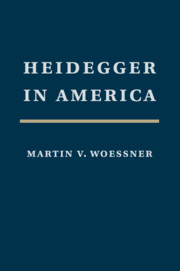Book contents
- Frontmatter
- Contents
- Preface
- Introduction: Being Here
- 1 Freiburg Bound
- 2 Exiles and Emissaries
- 3 Nihilism, Nothingness, and God
- 4 An Officer and a Philosopher
- 5 Dasein and das Man
- 6 The Continental Divide
- 7 Richard Rorty and the Riddle of the Book that Never Was
- 8 Ethics, Technology, and Memory
- 9 Culture Wars
- Conclusion: Being There
- Index
- References
2 - Exiles and Emissaries
Heidegger's Stepchildren in the United States
Published online by Cambridge University Press: 04 February 2011
- Frontmatter
- Contents
- Preface
- Introduction: Being Here
- 1 Freiburg Bound
- 2 Exiles and Emissaries
- 3 Nihilism, Nothingness, and God
- 4 An Officer and a Philosopher
- 5 Dasein and das Man
- 6 The Continental Divide
- 7 Richard Rorty and the Riddle of the Book that Never Was
- 8 Ethics, Technology, and Memory
- 9 Culture Wars
- Conclusion: Being There
- Index
- References
Summary
Without the guilty deed of parricide there is no autonomous self.
Hans LoewaldThe rise of political extremism in Europe in the decades leading up to World War II precipitated one of the largest intellectual and cultural migrations in history. As refugee scholars, writers, and artists lucky enough to have found a way out of Nazi- and fascist-occupied lands made their way across the Atlantic, they brought with them intellectual traditions and techniques that would go on to enjoy long and often profound afterlives in the New World. It is safe to say that their influence was deeply felt in the United States – enough, at least, to justify a seemingly endless number of books, seminars, lectures, and exhibitions devoted to the topic. “Exiles + Emigrés: The Flight of European Artists from Hitler,” a stunning program put together by the Los Angeles County Museum of Art (LACMA) in 1997 was but one of the most visible installments of – to borrow a metaphor from the world of publishing – a serialized story that has for many years maintained a healthy and sustained readership. Many of the smaller tales that, taken together, comprise this narrative of exile and emigration, especially when they relate to topics within the history of ideas, are well known, having been told with clarity and precision by both the refugees themselves and scholars who have – at least in some instances – devoted entire careers to the topic.
- Type
- Chapter
- Information
- Heidegger in America , pp. 40 - 91Publisher: Cambridge University PressPrint publication year: 2010

